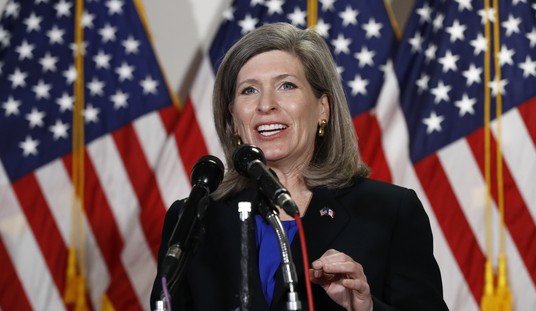Comedy gold courtesy of Cuffy Meigs. The first eight minutes show Dolezal rambling on about the mysterious hate crimes committed against her and her kids. The action starts at 7:55, when the interviewer surprises her by asking her to confirm that the black man she claims is her father really is her father. It’s all downhill from there.

Maybe she’s … “trans-racial”? Via Sean Davis, here’s what she told a newspaper three years ago:
Rachel Doležal was born in a teepee in Montana. She grew up wearing moccasins and was planting seeds by the age of 3…
After Montana, Doležal’s family moved to Colorado and then South Africa. All the while, she created art, finding her voice through an array of mediums. In her home in Coeur d’Alene, she fans out some photos on the kitchen table, pointing out the pieces she did in high school; her raw talent and powerful messages are undeniable. Even then, her desire to make sense of the human condition oozed from her work.
In 2000, Doležal earned a bachelor’s degree from Belhaven College in Jackson, Mississippi, and a master’s degree in 2002 from Howard University, a historically black university in Washington, D.C. She taught at Howard for two years before moving to Idaho. “Coming from a trans-racial family that has hop-scotched to a variety of racial-tension areas, I have seen racial hatred in many forms,” she says.
Doležal is a rainbow. African-American, Native American, German, Czech, Swedish, Jewish and Arabic, she is a poster child for diversity in all of its aspects.
The part about her being Czech, German, Swedish, and Native American (“possible traces”) appears to be true, at least. As for “trans-racial,” that’s also technically true: Her white parents have adopted black children, one of whom Dolezal has passed off as her own son. “Trans” in this context is a term used to describe adoptions that cross racial lines, not to imply that she or her family had “transitioned” a la Caitlyn Jenner from one race to the other — although maybe now Dolezal has no choice but to make that argument. When you’ve committed a fraud this absurd and elaborate, involving fake dads and fake sons and almost certainly fake hate crimes, the only path back to a modicum of sympathy is claiming that your identification with African-Americans is so complete that your entire racial identity has shifted because of it.
Will lefties back her up? Davis is having fun on Twitter this morning reminding them that it’s a staple of their rhetoric that “race is a social construct.” As such, there should be no problem, or less of a problem, with Dolezal identifying as black than with Jenner identifying as a woman. The counterargument will be that a white woman can’t claim authentic blackness because she hasn’t had to cope with prejudice, but Dolezal’s trying: Like Jenner, she’s taken on the physical trappings of the reality she aspires to. She’s curled her hair, she’s darkened her skin a bit (is that bronzer?), she’s the head of the NAACP, for cripes sake. She even claims fake black relatives to enhance the illusion. She wants the world to see her as black, notwithstanding the risk she runs of facing prejudice by doing so. What’s the progressive argument for rejecting that?
Update: I’m going to guess the progressive response goes something like this: Identifying as a woman isn’t a political identification, it’s a psychological urge that plays off biological differences. Bruce Jenner didn’t want to be a woman because he cares so deeply about equal pay for equal work, he wanted to be a woman because he “felt” feminine somehow and needed to express that. It’s hard to see what the analogy would be in Dolezal’s case. Did she always “feel” somehow that her skin should be darker than it really was? She claimed black identity, I assume, because she admired black culture and sympathized with the black experience in America, but rule one of progressivism is that a member of a privileged class can’t truly know what it means to be underprivileged, especially when privilege intersects with race. So Dolezal, a privileged white woman, comes off as grotesque, a cultural expropriator, while Jenner is okay.
The more cynical read on why progressives treat them differently is that one helps the lefty agenda while the other harms it. Jenner is another milepost in LGBT acceptance; the more mainstream she is, the more comfortable the public will be with gays, lesbians, and transgenders/transsexuals. Dolezal, meanwhile, diminishes the seriousness of civil rights for blacks by suggesting that being black is as easy as changing your hair and hitting the tanning bed more often.








Join the conversation as a VIP Member